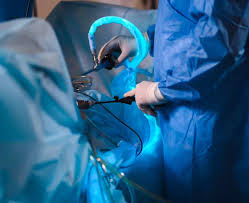Surgery for Colorectal Cancer | |||
 1,389 1,389  0 0  0 0 | |||
| Surgery is frequently the primary and sometimes the sole treatment approach for colorectal cancer. The specific surgical procedure employed is dictated by the tumor's location and size.
Partial Colectomy: The Standard ProcedureThe most common surgical intervention is a partial colectomy. During this procedure, the surgeon removes the cancerous portion of the colon or rectum along with a margin of surrounding healthy tissue. This ensures complete removal of the malignant cells.
Lymph Node RemovalConcurrent with tumor removal, surgeons typically excise nearby lymph nodes. This is a crucial step in accurately staging the cancer, as it allows for the detection of any cancer spread beyond the primary tumor site. This information is vital for determining the need for adjuvant therapies, such as chemotherapy or radiation.
Anastomosis and Colostomy: Re-establishing Bowel Function1) Anastomosis: Reconnecting the BowelWhenever possible, the surgeon will reconnect the remaining healthy sections of the colon or rectum. This reconnection is called anastomosis. It allows for the restoration of normal bowel function.
2) Colostomy: When Reconnection Isn't PossibleIn situations where the healthy sections of the colon or rectum cannot be immediately reconnected, a colostomy becomes necessary. A colostomy involves creating an opening, called a stoma, in the abdomen. Through this stoma, solid waste is diverted and exits the body. The patient then wears a special bag over the stoma to collect the waste.
3) Temporary vs. Permanent ColostomiesA colostomy can be either temporary or permanent. A temporary colostomy is sometimes performed to allow the lower colon or rectum to heal adequately following surgery. In a subsequent procedure, the surgeon can reconnect the bowel and close the colostomy, restoring normal bowel function.
While a permanent colostomy is sometimes required, it's important to understand that most patients adapt to their new lifestyle. Nurses or enterostomal therapists provide comprehensive education on stoma care and management. With proper care and support, most patients are able to return to their previous routines and activities. Tags: Adjuvant Therapy Calcium Cancer Cells Cavity Colorectal Cancer Colorectal Polyps Enterostomal Therapist Genetic Aspect Hormonal Therapy Stoma Surgeon Temporary Colostomy 대장암 | |||
| |||
| | |||
|
 3350
3350 